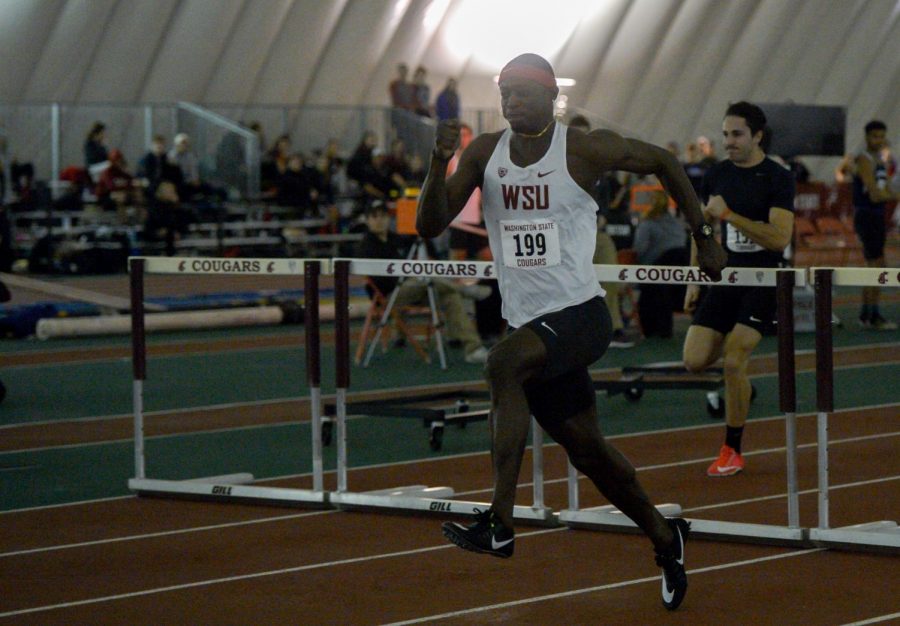Kamara hurdling toward end of career at WSU
Senior was part of search committee that brought in Pat Chun
ABBY LINNENKOHL | DAILY EVERGREEN FILE
Abu Kamara competes in the 60 meter hurdles during the Cougar Indoor on Feb. 3.
February 15, 2018
Born in Freetown, Sierra Leone, raised in Kent, Washington, and now in his final season as a hurdler on the track and field team at WSU, Abu Kamara certainly has a unique story.
He spent the first 10 years of his life living in Africa before his parents decided to move to the U.S. to give their children a better education. It was then that Abu, his brother Ali, and his mother Isata moved to Kent, where a family friend resided.
Fortunately, the Kamaras learned English while living in Sierra Leone, making their transition easier.
“I think I came at an age where everyone was still learning, so I just joined in on the learning,” Kamara said. “I think if I would have came here a little bit older it would have been challenging, because everything would have been set in stone. There wasn’t much of a language barrier either, so I think that helped out quite a bit.”
Kamara didn’t show signs of athletic ability until sixth grade, when he sprouted to 6 feet and his physician told him he might get up to 6-foot-8-inches. With that projection, Kamara dreamed of playing college basketball.
Even with basketball as his first love, Kamara still participated in football in the fall, and track and field in the spring.
“It was a way for me to hang out with my friends, and it was a new challenge to me,” Kamara said. “I had never really played any of these sports but knew about them, and so I thought it was fun. And here, in most schools it’s free, so it was pretty easy for me to get into it.”
As Kamara grew older, his physician’s estimate seemed to be a little farfetched. In his time at Kent-Meridian High School, he was just two inches taller than he was in the sixth grade.
For Kamara’s entire youth basketball career he had been a towering presence in the post. In high school, he did not have the same presence, and making it as a forward at the collegiate level seemed impossible due to his height.
But on the track, Kamara felt right at home.
“It was something that I was naturally successful at,” he said. “I didn’t have to try as hard as I did in basketball to reach the same level of success in track. But I still enjoyed it a good deal, so it kept me coming back.”
At the end of Kamara’s junior year in high school, he attended a weeklong track camp at WSU. After catching a couple of the coaches’ eyes and a few months of email exchanges, WSU extended Kamara an official visit. Kamara said he visited the Palouse one more time and fell in love all over again.
In his time at WSU, Kamara has been incredibly involved in leadership roles around the Athletic Department. He served as his team’s representative for the Student-Athlete Advisory Committee, which communicates student-athletes’ needs and concerns to administration.
This year he enhanced his role in SAAC by becoming the president of the committee. This engagement has helped him branch out and meet other athletes within the department.
“The more I knew about the responsibilities of SAAC, the more involved I wanted to be,” Kamara said. “I felt like I was in a position where I could speak for others who weren’t aware.”
In addition to his work with SAAC, he was appointed to the search committee that selected new Athletic Director Patrick Chun. Kamara had no problems being sworn to secrecy at the time, although he admitted his teammates and coaches would often give him a hard time about it.
“It was a really awesome experience, I had a lot of fun doing it,” Kamara said. “When I was first asked to be a part of the search committee I was just really excited. I was like, ‘I get to work with the president? This is awesome, I can’t say no to that.’ But I didn’t really know what my responsibilities were gonna be.”
It was Kamara’s responsibility to bring a student-athlete perspective to the decision about what traits are desirable in an AD. Similar to his role in SAAC, he would often go around the Athletic Department and ask different student-athletes for their opinions.
Now in his final season, Kamara is looking to do what he has always done: run a little faster than he did the week before.
Despite an injury in his hip for the past two seasons, Kamara feels healthy and ready to end his career on a high note.
“I’m looking to go out at my best,” he said. “One of the reasons why I chose to run track was because I wanted to see how far I can go with it, and how much I can improve. So every year I come in with the same goal, to improve upon the year before.”








